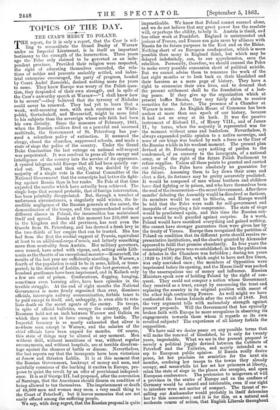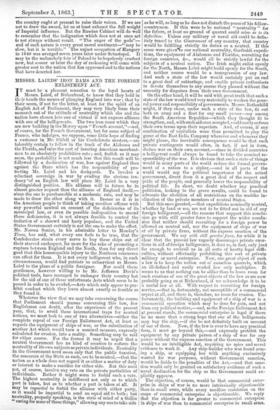TOPICS OF THE DAY.
THE CZAR'S MERCY TO POLAND.
THE report, for it is only a report, that the Czar is wil- ling to reconstitute the Grand Duchy ofWarsaw under an Imperial Lieutenant, is in itself an important testimony to the strength of the insurrection. Three years ago the Poles only claimed to be governed as an inde- pendent province. Provided their religion were respected, the right of educating themselves conceded, the rela- tions of nobles and peasants amicably settled, and indus- trial enterprise encouraged, the party of progress, headed by Count Andre Zamoiski, desired nothing more for years to come. They knew Europe was weary of the Polish ques- tion, they desponded of their own strength, and in spite of the Czar's unworthy speech at Warsaw—" I shall know how to be severe"—they believed that the tyranny of Nicholas could never be renewed. They had yet to learn that a weak, well-meaning man, with such creatures as Wielo- polski, Gortschakoff, and Mouravieff, might be more fatal to his subjects than the sovereign whose sole faith had been his own divinity. Since the massacre of February, 1861, when the Russian soldiers fired on a peaceful and unarmed multitude, the Government of St. Petersburg has pur- sued a relentless policy of extinction. It menaced the clergy, closed the churches, suppressed schools, and made a state of siege the police of the country. Under the Grand Duke Constantine the last outrage on national self-respect was perpetrated. It was resolved to press all the energy and intelligence of the country into the service of its oppressors. A cynical telegram told Europe that all had been quietly car- ried out. Then, and then only, it was decided by the majority of a single vote in the Central Committee of the National Government 'that the conscripts had better die fight- ing against Russia than in her ranks. No Pole at that time expected the results which have actually been achieved. The single hope that seemed probable, that of foreign intervention, has been painfully disappointed. But, through a number of unforeseen circumstances, a singularly mild winter, the in- credible negligence of the Russian generals at the outset, the demoralization of the troops, and the unprecedented union of different classes in Poland, the insurrection has maintained itself and spread. Russia at this moment has 250,000 men in the kingdom and the old provinces, has sent even the Guards from St. Petersburg, and has decreed a fresh levy in the two-thirds of her empire that can be trusted. She has had from the first the cordial support of Prussia, equivalent at least to an additional corps (Fannie, and latterly something more than neutrality from Austria. Her military governors, once roused, have acted with vigour, and, setting aside Lith- uania as the theatre of an exceptional monster—Mouravieff, the results of the last year are sufficiently startling. In Warsaw, a fourth of the population is said to be in arms, killed, or trans- ported; in the district of Lublin, one of the best governed, one hundred gentlemen have been imprisoned, and in Kalisch only a few are out of prison. Confiscations, flogging, hanging, sometimes even burning alive, have been episodes in the terrible struggle. At the end of eight months the National Government is more firmly organized than ever, dismisses officials, interrupts railway communication, forbids taxes to be paid except to itself, and, unhappily, is even able to reta- liate death on the secret agents of the enemy. Its troops, in spite of official bulletins, occupy the country, and the Russians hold not an inch between Warsaw and Galicia on which they are not in force enough to give battle. The Imperial treasury is so nearly exhausted that silver is nowhere seen except in Warsaw, and the salaries of the chief officials have been unpaid for months. Of course, this state of things may be altered at any moment. Men without drill, without munitions of war, without regular encampments, and without hospitals, are at terrible disadvan- tage against the chances of battle or disease. Nevertheless, the last reports say that the insurgents have been victorious at Janow and threaten Lublin. It is at this moment that the Russian Government, bankrupt of money and men, and painfully conscious of the loathing it excites in Europe, pro- poses to quiet the revolt by an offer of provisional independ- ence. It is as if George III. had proposed, after the convention of Saratoga, that the Americans should disarm on condition of being allowed to tax themselves. The imprisonment or death of 40,000 men and women may seem a very small thing to the Court of Peterhoff; but it leaves memories that are not easily effaced among the suffering people.
We say, with deep regret, that the Russian proposal is quite impracticable. We know that Poland cannot succeed alone, and we do not believe that any great power has the resolute will, or perhaps the ability, to help it. Austria is timid, and has other work at Frankfort. England is uninterested and jealous of France, and France can gain more by alliance with Russia for its future purposes in the East and on the Rhine.
Nothing short of an European conflagration, which is more possible than many in England think, but which may be delayed indefinitely, can, to our apprehension, save the rebellion. Personally, therefore, we should counsel the Poles to make every possible concession short of political suicide.
But we cannot advise them to renounce the work of the last eight months or to look back on their bloodshed and their heroism as a mere page of history. They have a right to economize their own lives, and to demand that the present settlement shall be the foundation of a last- ing peace. If they give up the organization which at present baffles Russia, they may fairly claim to receive securities for the future. The presence of a Chamber at Warsaw is none. An English House of Commons has been useless at more than one epoch of our history, because it had not an army at its back. It was the passive instrument of Richard II., of Henry VIII., and of James II., by turns, when the majority it represented was for the moment without arms and leaderless. Nevertheless, it always expounded public opinion to a native sovereign, and none of our kings was backed by such a force as the Czar of the Russias wields in his weakest moment. The present plan devised at St. Petersburg says nothing of pardon to the condemned, of an amnesty to the insurgents, of a national army, or of the right of the future Polish Parliament to. refuse supplies. Unless all these points be granted and carried out loyally, the Poles have absolutely no guarantee for the future. Assuming them to lay down their arms and elect a diet, its fortunes may be pretty accurately predicted. It would be composed of men whose brothers and children have died fighting or in prison, and who have themselves been the soul of the insurrection—the secret Government. After three months' debating the Assembly would be dissolved as factious, its members would be sent to Siberia, and Europe would be told that the Poles were unfit for self-government and incapable of accepting a fair compromise. The state of siege would be proclaimed again, and this time the Russian out- posts would be well guarded against surprise. In a word, Poland would have sacrificed everything and gained nothing. She cannot have stronger guarantees than were given her by the treaty of Vienna. Europe then recognized the partition of Poland on condition that its different parts should receive re- presentative institutions, and the charter granted by Alexander appeared to fulfil that promise abundantly. In four years the censorship of the press was re-established; in ten the publication of debates in the Chambers was forbidden ; during ten years (1820 to 1830) the Diet, which ought to have met five times, was only convoked once ; the members of Opposition were imprisoned before its opening, and the House itself was packed by the unscrupulous use of money and influence. Russian Ministers speak now of holding Poland by the right of con- quest. They could not conquer a nation whose Government they received as a trust, except by renouncing the trust and replacing the country in its original position with assent of the other high contracting Powers. As well might we have confiscated the Ionian Islands after the revolt of 1848. But the very argument tells with melancholy strength against present proposals. Will the Government that has cynically broken faith with Europe be more scrupulous in observing its engagements towards those whom it regards as its own revolted subjects? The experience of all history forbids the supposition. We have said we desire peace on any possible terms that will make the renewal of bloodshed, be it only for twenty years, improbable. What we see in the present proposal is merely a political juggle devised between the Cabinets of Peterhoff and the Tuileries, and mainly- intended as a sop to European public opinion. If Russia really desire peace, let her proclaim an armistice for the next six months, confining her troops to the towns they already occupy, and meanwhile let her set her prisoners at liberty, relax the state of siege in the places she occupies, and open European conferences. The pretension to misgovern at will a province in the centre of Europe and on the confines of Germany would be absurd and intolerable, even if our right to interfere were not matter of compact. The threat of re- calling our Ambassador would probably in itself determine her to this concession; and it is for this, as a natural and moderate course of action, that English Liberals throughout
the country ought at present to raise their voices. If we are not to draw the sword, let us at least exhaust the full weight of Imperial influence. But the Russian Cabinet will do well to remember that the indignation which does not at once act is not always without result. " The anger of the gods"— and of such nature is every great moral sentiment—" may be slow, but it is terrible." The unjust occupation of Hungary in 1849 was avenged seven years later under Sebastopol. It may be the melancholy fate of Poland to be hopelessly crushed now, but sooner or later the day of reckoning will come with greater cost to the nation that has oppressed and to the nations that have deserted her.































 Previous page
Previous page